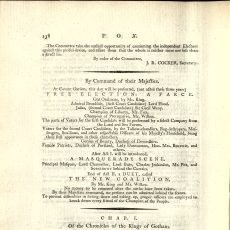Nov
1806
liverpool
Contested
GENERAL ELECTION
In the general election of Nov 1806, 2352 people voted. There were 3 candidates, with Isaac Gascoyne & William Roscoe elected.
Poll book data from:
Citation: A compendious and impartial account of the election… (Liverpool: Wright & Cruickshank, [1806])
Source: John Sims (ed.), A Handlist of British Parliamentary Poll Books (Leicester, 1984); Jeremy Gibson and Colin Rogers (eds.), Poll Books, 1696–1872: A Directory of Holdings in Great Britain (4th edn., Bury, 2008); L. W. L. Edwards (ed.), Catalogue of Directories and Poll Books in the Possession of the Society of Genealogists (4th edn., 1984).
Timeline & Key Statistics
Contexts & Remarks
- The Liverpool general election of 1806 was fought between three candidates: Isaac Gascoyne (the corporation nominee); Banastre Tarleton (who had forsaken the Whigs to support the Pitt Administration); and William Roscoe (a Presbyterian Whig intellectual and staunch abolitionist). Despite his late entry into the fray and opposition to the slave trade, Roscoe narrowly topped the poll, with Gascoyne taking the second seat.
- A subscription was opened to fund Roscoe's campaign, which ended up costing over £11,000, compared to £7,000 each by Gascoyne and Tarleton.
- Roscoe polled 873 plumpers and took the lead during the sixth day of polling, while the other two candidates shared 637 voted and were accused of entering into a 'dreadful coalition' against Roscoe, which they denied.
- As its title implies, the poll book opens with a 'compendious and impartial' account of the election, and closes with 45 pages of various papers, addresses, songs, and other printed election literature produced during the contest.
- While Roscoe and his committee emphasised independence, integrity, and his intellectualism, his rivals attacked him for his religion, and branded his supporters as Jacobins and enemies of 'the African trade'. In turn, 'the Generals' were characterised as corrupt placemen.
- There were two serious disturbances. On 1 November a mob tore through Bridge Street and ransacked several houses, with all sides stridently denying responsibility for the 'disgraceful and unmanly atrocities' (An impartial collection of the addresses, songs, squibs, &c. that were published at Liverpool? (Dublin: John Adams, [1806]), pp. 45, 53). Then, on 3 November, Roscoe's supporters were subjected to what they believed was a 'premeditated attack ? by a body of men ? on horseback, bearing in procession an axe and a sword ? provided with bludgeons, burst into the Hustings'. The culprits were Tarleton's 'Jolly Butchers' (though they were not all butchers by trade), who conducted him to the hustings each day in military fashion. In response, Roscoe warned his supporters that any violence offered in retaliation would lead to his withdrawal from the contest. (Liverpool Archives, 920 ROS/3880: 'To the Independent Electors of Liverpool', 4 Nov. 1806).
People & Places
Poll Book
Below is a digitised version of the poll book for this election:



